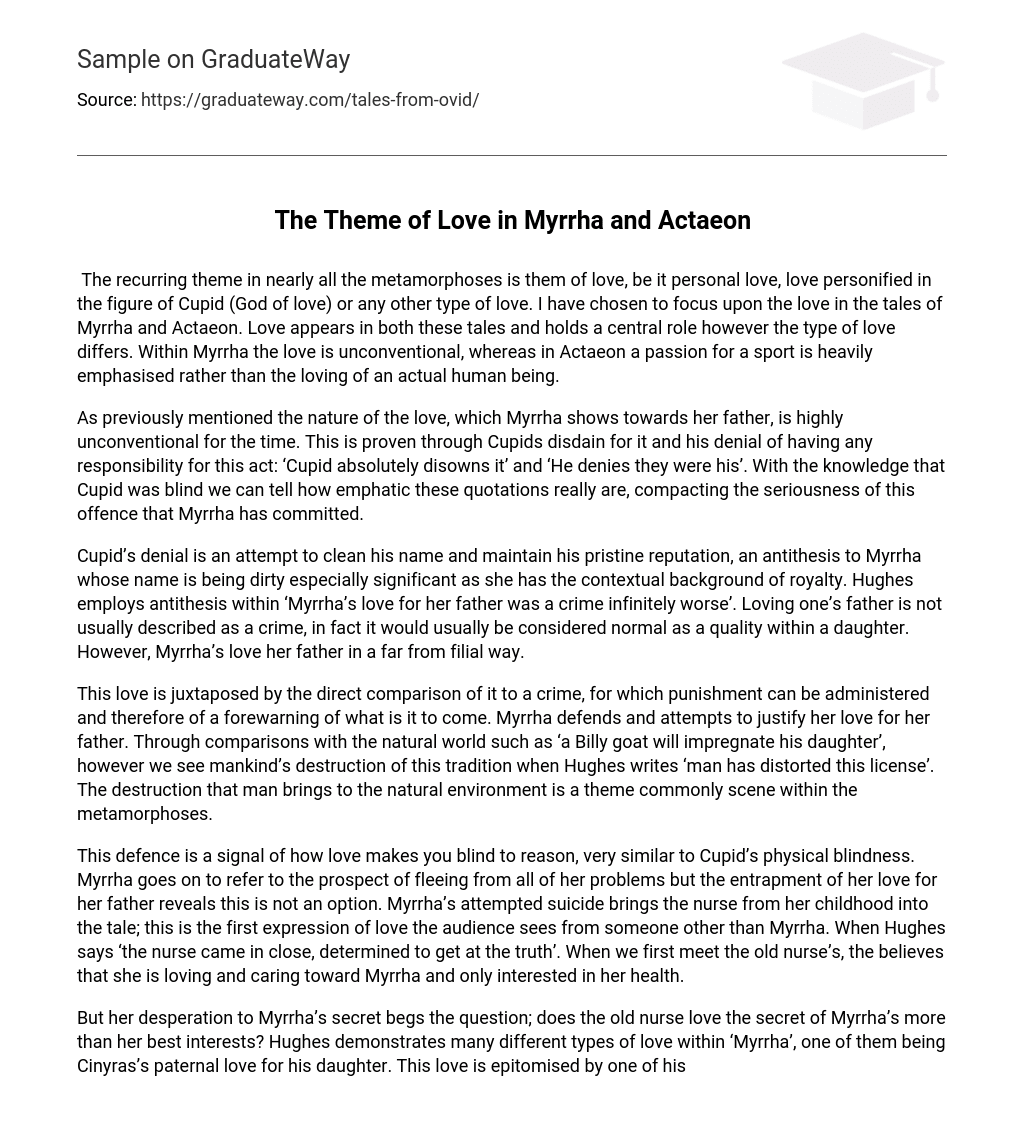The recurring theme in nearly all the metamorphoses is them of love, be it personal love, love personified in the figure of Cupid (God of love) or any other type of love. I have chosen to focus upon the love in the tales of Myrrha and Actaeon. Love appears in both these tales and holds a central role however the type of love differs. Within Myrrha the love is unconventional, whereas in Actaeon a passion for a sport is heavily emphasised rather than the loving of an actual human being.
As previously mentioned the nature of the love, which Myrrha shows towards her father, is highly unconventional for the time. This is proven through Cupids disdain for it and his denial of having any responsibility for this act: ‘Cupid absolutely disowns it’ and ‘He denies they were his’. With the knowledge that Cupid was blind we can tell how emphatic these quotations really are, compacting the seriousness of this offence that Myrrha has committed.
Cupid’s denial is an attempt to clean his name and maintain his pristine reputation, an antithesis to Myrrha whose name is being dirty especially significant as she has the contextual background of royalty. Hughes employs antithesis within ‘Myrrha’s love for her father was a crime infinitely worse’. Loving one’s father is not usually described as a crime, in fact it would usually be considered normal as a quality within a daughter. However, Myrrha’s love her father in a far from filial way.
This love is juxtaposed by the direct comparison of it to a crime, for which punishment can be administered and therefore of a forewarning of what is it to come. Myrrha defends and attempts to justify her love for her father. Through comparisons with the natural world such as ‘a Billy goat will impregnate his daughter’, however we see mankind’s destruction of this tradition when Hughes writes ‘man has distorted this license’. The destruction that man brings to the natural environment is a theme commonly scene within the metamorphoses.
This defence is a signal of how love makes you blind to reason, very similar to Cupid’s physical blindness. Myrrha goes on to refer to the prospect of fleeing from all of her problems but the entrapment of her love for her father reveals this is not an option. Myrrha’s attempted suicide brings the nurse from her childhood into the tale; this is the first expression of love the audience sees from someone other than Myrrha. When Hughes says ‘the nurse came in close, determined to get at the truth’. When we first meet the old nurse’s, the believes that she is loving and caring toward Myrrha and only interested in her health.
But her desperation to Myrrha’s secret begs the question; does the old nurse love the secret of Myrrha’s more than her best interests? Hughes demonstrates many different types of love within ‘Myrrha’, one of them being Cinyras’s paternal love for his daughter. This love is epitomised by one of his actions and Myrrha’s response to it. Cinyras ‘dried her face and kissed her’; this is a typical parental action and infers nothing more than a parental relationship on his behalf however Myrrha’s response to this action is one of a lover. She clung to his neck, half swooning at his kisses’, Hughes’s use of verbs here emphasises how unrequited the love between the two is as ‘swooning’ is to be emotionally affected by someone, or something that one admires. In this context she becomes sexually excited by Cinyras by a completely docile act, however Hughes shows the power of the imagination and its distortive power on the reality at hand. Similar to Myrrha the poem of Actaeon explores qualities outside the normality of society.
Within Actaeon it is shown thrown through the excessive amount of hunting, shown through avid descriptions of their weapons and prize game: ‘the slopes were patched red with the butchering places. ’ This is a repetition of human’s damaging effect on the environment which we see in Myrrha also, as the slopes would not usually be ‘patched red’ implying the significant amount of slaughtering that has occurred. The audience therefore can make the simplest of assumptions; that Actaeon loves to hunt.
As we have seen in Myrrha it is her love that makes her an outcast of society, will there be a repetition of such fortune? Actaeon’s love for the hunt is only equalled by his transfixion when he sees the Goddess of Hunt, Diana. His obsession with the hunt is then reverted upon himself when he experiences for the first time what it is like to be hunted. Mankind’s dominance over the surrounding environment including animals means we rarely feel any type of imminent danger, however when roles are reversed Actaeon’s obsession becomes a severe discomfort for him as he is chased across mountaintops.
Where eventually he meets his death at the hands of his very own dogs, his obsession with hunting balances out as the hunted take their retribution on Actaeon with as much brutality in his death as he hunted. Once again, similar to Myrrha in that the subject’s love ends to their ultimate demise whether it is social- Myrrha’s fall from royalty to outcast or physical- Actaeon’s active hunting to his brutal death.





